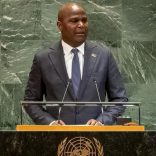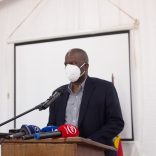Mozambique: Europe announces €13M to support low-emission energy transition, encourage private ...
Coal and natural gas can save Mozambique crisis?

DW / Coal mining in Moatize, Tete province
Experts, economists and industry entrepreneurs have no doubt that, despite the reduction of prices in the international market, coal and natural gas exploration can be the solution to the Mozambican crisis.
Experts say that if the country improves its infrastructure the effects of the crisis may be lower than expected.
Industry expert José Saide believes that the price of raw materials will not fall forever.
“In the medium and long term there may be a recovery both in gas and coal prices, especially coking coal. With regard to thermal coal we understand that we have an opportunity to generate power domestically,” he says.

Prakash Ratilal, economist and chairman of Moza Banco, says the country needs to make more investments in this sector, but with more transparency. “Global recovery means transparency, means rigour, means publishing balance sheets,” he explains. “Companies should publish the audited balance sheets, displaying accuracy in accounts and rigour in the control of expenses.”
For Ratilal, it is important to “enforce the rules. The state rules, state laws, rules of the central bank and the rules of the Ministry of Finance”.
Investing in agriculture to combat malnutrition
Paulo Lopes, entrepreneur in the energy sector, highlights the importance of natural gas exploitation for the country’s exports, because “the whole world is looking to Mozambique.” “Because of its large reserves and great potential for future expansion, Mozambique is a world draw card. [Mozambique] has a large market and I have no doubt that at this point in time it is one of the major powers in the world in the gas sector. “
But for Tomas Salomão, economist and former Mozambique finance minister, diversification of the economy must involve agriculture, because “only integrated rural development will enable us to create jobs in the first place. [We also need] to raise productivity, produce more food for domestic consumption to combat hunger and malnutrition, and rethink the way we look at agriculture”.
Recently, the International Monetary Fund and other social partners cut financial aid to the country as a result of underreporting of state-guaranteed loans worth more than one billion dollars contracted by companies EMATUM, Proíndicus and Mozambique Asset Management.













Leave a Reply
Be the First to Comment!
You must be logged in to post a comment.
You must be logged in to post a comment.